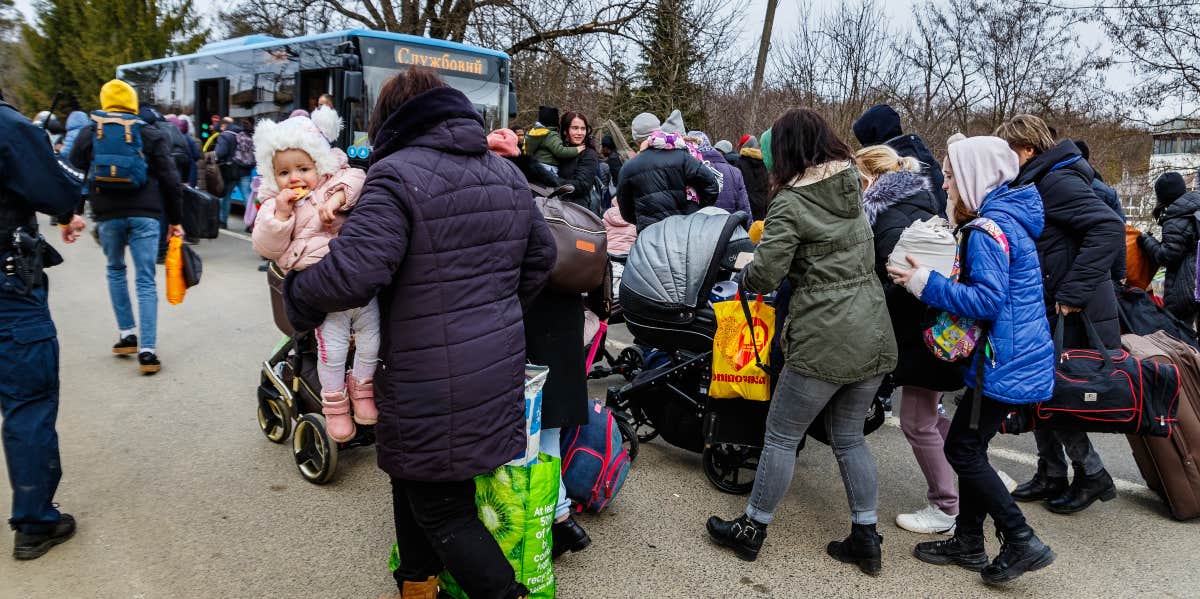Ukrainian Surrogates Face Pressure To Stay In War Zones While Waiting For Parents To Collect Their Babies
Something needs to be done for these women.
 Yonosh Nemesh/Shutterstock
Yonosh Nemesh/Shutterstock In the face of ongoing war with Russia, many Ukrainians are being forced to make the most difficult choices of their lives: whether to flee their country or to stay in the dangerous war zones as Russia continues to invade.
Many stories have emerged from Ukraine of families battling for their lives and, among them, have been tales of non-Ukrainian parents desperately trying to escape the war with their children who were born via Ukrainian surrogates in recent months.
While many of these parents and newborn have found safe passage back home, the women who carried these children — or are currently carrying children — have been forgotten about.
There are many legal factors are pressuring Ukrainian surrogates to stay and have their babies within Ukraine before they flee the country.
These Ukrainian surrogates could become trapped in a war zone until they give birth.
In certain Ukrainian clinics, contract requirements mandate that their surrogates give birth in Ukraine, despite the continuing invasion that has been devastating the country.
In the case of one particular Kyiv surrogacy clinic, as reported by the New York Post, the surrogates must give birth in “a bomb shelter-turned-maternity ward,” due to legal agreements that probably did not account for a possible invasion.
And for the women who did choose to flee, BioTexCom Clinic made arrangements for them to return to the sight closer to their due dates, to make sure the agreements are still upheld.
Meanwhile, beyond contracts, many surrogates face other legal difficulties in their attempts to flee the country.
Surrogacy is illegal in many countries, including many countries neighboring Ukraine.
Fleeing surrogates may face all kinds of legal troubles outside of Ukraine beyond their own personal contracts because in many countries that Ukrainian refugees are flooding to, commercial surrogacy is not legal.
Commercial surrogacy is a widely debated topic globally, so there is little accommodation to laws that disagree with the local country.
According to BBC, since there are no recognized laws for surrogacy internationally, parents and babies are often left vulnerable and/or stateless.
While the ethics of commercial surrogacy is up for debate, these conflicting laws could be putting many lives at risk.
Critics of commercial surrogacy sometimes refer to the practice as “rent-a-womb tourism,” and say that it is exploitative of women.
While it is likely that many of the women who are being forced to stay in a war zone to carry out their surrogacy contracts feel exploited by the system right now, these laws that now make it riskier for them to escape their war-torn country is no doubt only adding to that feeling.
BioTexCom Clinic addresses these international law issues in their translated statement on Facebook, saying, “Giving birth to the child outside of Ukraine is not legal and will have legal consequences: the surrogate mother will be considered a mother and the attempt to deliver the child [to the parents] will be considered child trafficking.”
They even add “Such acts will be punishable by imprisonment or fines.”
As if there was not enough for these Ukrainian women to worry about; these conflicting laws may force them to take care of the child when they had already sacrificed their bodies for nine months to allow hopeful parents to have a child they couldn’t have on their own.
That’s not even to mention the parents’ own pain; many of them have struggled to have children for many years and this could be their last chance to have a biological child, at the price of many thousands of dollars.
Now, if those parents have to retrieve their child from a country that prohibits commercial surrogacy, they would face serious legal consequences for it along with the surrogate mother.
Fleeing Ukraine is already dangerous in itself.
While not an issue specific to fleeing surrogates, so far there have been hundreds of deaths as a result of Russian forces reportedly breaking cease-fire agreements that were put in place to protect fleeing Ukrainian civilians.
These risks on top of pressure from foreign laws and, in some cases, their own business contracts could keep many Ukrainian surrogates in place at least until the end of their pregnancies, which is a long time to wait for a way out of war zone.
Amanda Hartmann is a writer and editorial intern with YourTango who write on news and entertainment.
